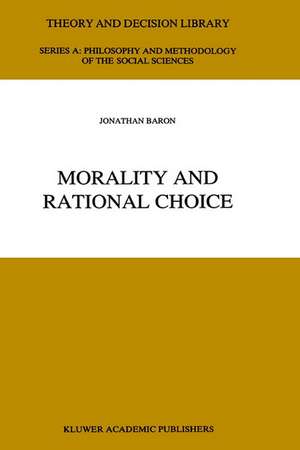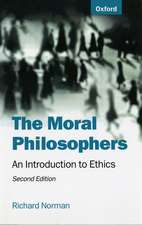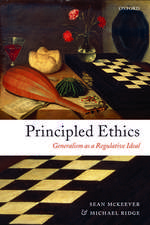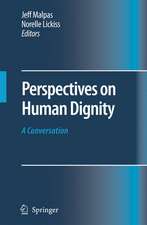Morality and Rational Choice: Theory and Decision Library A:, cartea 18
Autor J. Baronen Limba Engleză Hardback – 31 mai 1993
| Toate formatele și edițiile | Preț | Express |
|---|---|---|
| Paperback (1) | 636.80 lei 43-57 zile | |
| SPRINGER NETHERLANDS – 3 dec 2010 | 636.80 lei 43-57 zile | |
| Hardback (1) | 642.83 lei 43-57 zile | |
| SPRINGER NETHERLANDS – 31 mai 1993 | 642.83 lei 43-57 zile |
Din seria Theory and Decision Library A:
- 18%
 Preț: 952.40 lei
Preț: 952.40 lei -
 Preț: 382.57 lei
Preț: 382.57 lei - 18%
 Preț: 958.25 lei
Preț: 958.25 lei - 18%
 Preț: 949.23 lei
Preț: 949.23 lei - 18%
 Preț: 1232.09 lei
Preț: 1232.09 lei - 15%
 Preț: 643.34 lei
Preț: 643.34 lei - 18%
 Preț: 948.92 lei
Preț: 948.92 lei - 15%
 Preț: 581.79 lei
Preț: 581.79 lei - 15%
 Preț: 644.49 lei
Preț: 644.49 lei -
 Preț: 389.70 lei
Preț: 389.70 lei - 18%
 Preț: 947.67 lei
Preț: 947.67 lei - 15%
 Preț: 641.20 lei
Preț: 641.20 lei -
 Preț: 388.90 lei
Preț: 388.90 lei - 15%
 Preț: 640.37 lei
Preț: 640.37 lei - 18%
 Preț: 952.26 lei
Preț: 952.26 lei - 15%
 Preț: 641.20 lei
Preț: 641.20 lei - 18%
 Preț: 953.35 lei
Preț: 953.35 lei - 18%
 Preț: 952.89 lei
Preț: 952.89 lei - 18%
 Preț: 951.47 lei
Preț: 951.47 lei - 15%
 Preț: 636.94 lei
Preț: 636.94 lei - 18%
 Preț: 944.82 lei
Preț: 944.82 lei - 15%
 Preț: 643.84 lei
Preț: 643.84 lei - 18%
 Preț: 1383.81 lei
Preț: 1383.81 lei - 18%
 Preț: 1331.51 lei
Preț: 1331.51 lei - 20%
 Preț: 641.99 lei
Preț: 641.99 lei - 15%
 Preț: 647.40 lei
Preț: 647.40 lei
Preț: 642.83 lei
Preț vechi: 756.27 lei
-15% Nou
Puncte Express: 964
Preț estimativ în valută:
123.04€ • 133.70$ • 103.42£
123.04€ • 133.70$ • 103.42£
Carte tipărită la comandă
Livrare economică 21 aprilie-05 mai
Preluare comenzi: 021 569.72.76
Specificații
ISBN-13: 9780792322764
ISBN-10: 0792322762
Pagini: 208
Ilustrații: VIII, 208 p.
Dimensiuni: 156 x 234 x 14 mm
Greutate: 0.49 kg
Ediția:1993
Editura: SPRINGER NETHERLANDS
Colecția Springer
Seria Theory and Decision Library A:
Locul publicării:Dordrecht, Netherlands
ISBN-10: 0792322762
Pagini: 208
Ilustrații: VIII, 208 p.
Dimensiuni: 156 x 234 x 14 mm
Greutate: 0.49 kg
Ediția:1993
Editura: SPRINGER NETHERLANDS
Colecția Springer
Seria Theory and Decision Library A:
Locul publicării:Dordrecht, Netherlands
Public țintă
ResearchCuprins
1 Introduction.- 1.1 Utilitarianism.- 1.2 Prospectus.- 1.3 Critical vs. intuitive.- 2 Morality and decision making.- 2.1 The argument for consequentialism, restated.- 3 The nature of goals.- 3.1 Types of goals.- 3.2 Sadistic goals.- 3.3 Erroneous subgoals.- 3.4 Goals and preferences.- 3.5 What goals?.- 3.6 Conclusion.- 4 Expected utility theory.- 4.1 Criticisms of expected-utility.- 4.2 The independence principle.- 4.3 Regret.- 4.4 Transitivity.- 4.5 Ambiguity.- 4.6 Summary.- 4.7 Appendix: Utility measurement.- 5 Decisions for others.- 5.1 Interpersonal comparison.- 6 Self-other conflict.- 6.1 Normative theories of social dilemmas.- 6.2 Weighted utilitarianism.- 6.3 The effect of time.- 6.4 Conclusion.- 7 Acts and omissions.- 7.1 The main argument.- 7.2 Why people make the distinction.- 7.3 Prescriptive implications.- 7.4 Conclusion.- 8 Utilitarian education.- 8.1 Implications for moral education.- 8.2 Potential advantages: Bad intuitions.- 8.3 The potential dangers of critical thinking.- 8.4 The content of moral education.- 8.5 The nature of virtue.- 8.6 The virtues of citizenship.- 8.7 Conclusion.- 9 Decision analysis and public policy.- 9.1 Issues in decision analysis.- 9.2 The value of life.- 9.3 Conclusion.- 10 Equity hi social policy and liability.- 10.1 Distribution.- 10.2 Liability: deterrence and compensation.- 10.3 Nonpecuniary damages.- 11 The risk analysis debate.- 11.1 Voluntary vs. involuntary.- 11.2 Natural vs. unnatural.- 11.3 Catastrophic vs. gradual.- 11.4 Ambiguous risks.- 11.5 Equity in risk distribution.- 11.6 Ex post vs. ex ante equity.- 12 Social decisions.- 12.1 The classification.- 12.2 An example.- 12.3 Rights and duties.- 12.4 Advantages and disadvantages.- 12.5 Virtues and vices.- 12.6 Conclusion.- References.



















